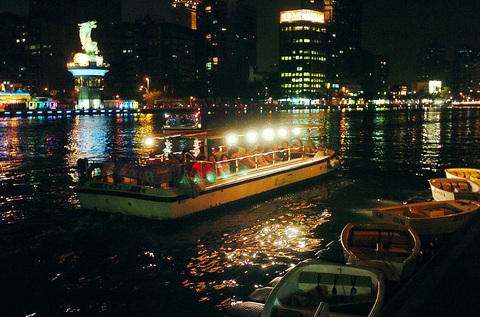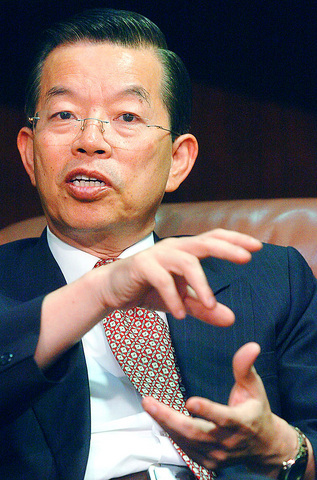Taipei Times: Kaohsiung City, where you took on the campaign aide for the pan-green camp in the legislative elections, was a success. It was also one of the few cities that could surpass the expected goal set by the Democratic Progressive Party (DPP). What was the key to Kaohsiung City' s role in the elections?
Hsieh: I think the key to our performing well in the legislative elections was that the Kaohsiung City Government gave citizens the general impression that we are a united administrative team.

PHOTO: GEORGE TSORNG, TAIPEI TIMES
And we did make some achievements in municipal construction.

PHOTO: GEORGE TSORNG, TAIPEI TIMES
At present, the DPP and the Taiwan Solidarity Union (TSU) have the majority in the Kaohsiung City Council, which is advantageous to me in implementing reforms and construction projects.
In fact, we obtained similar number of votes in the legislative elections as in the presidential election.
We tried to advocate to voters the idea that "when you choose Taiwan you also choose Kaohsiung." We highlighted the importance of cooperation.
In the elections, the candidates of the pan-green camp made a commitment to voters with a common campaign platform. They promised Kaohsiung citizens to win more budget increases and to speak for the city in the Legislative Yuan.
And I think such an appeal touched people's hearts and might be a good example for other cities and counties to apply in the future elections. Kaohsiung's case also proved that it worked for candidates to make campaign commitments that are related to local developments, not to just ideological issues.
But I have to say that the DPP did not really lose the legislative elections; in fact, the DPP representation increased by two more seats than it did in the last elections. The DPP just created an impossibly high standard to attain for the elections, by which it increased by at least two percent of votes.
Taipei Times: Now that the pan-green camp failed to become the legislative majority, how do you think the pan-green camp should act in future legislative sessions?
Hsieh: It is normal for a country or a society to encounter choke points at times. I think the best way to deal with such a situation is to figure out a new way of doing things and to seek allies for cooperation. Taiwan can't afford to get nowhere for another three years and the world won't wait for you. Although there will be many difficulties in working together with other parties, I think the DPP still has to cooperate with them [the opposition parties] on certain issues and together create a win-win situation.
Taipei Times: People of Taiwan, not only in Kaohsiung but also in other cities, have witnessed and experienced the dramatic changes of Kaohsiung City. Kaohsiung has become the most important city in south Taiwan and competes with Taipei City in many ways. What are the areas in which you are confident of surpassing Taipei City, in terms of recent developments in Kaohsiung?
Hsieh: Although we've been promoting an idea that Kaohsiung City does not try to become the "number one city" but to come out as an "one and only city," the city government team has brought about some positive changes to the quality of life for Kaohsiung citizens, and we have at least 15 progressive indicators in municipal achievement that could rival Taipei City.
For example, Kaohsiung citizens enjoy the highest percentage of the green belt and park spaces compared to other cities' urban planning.
Adding the riverbank and wetland areas, each Kaohsiung citizen enjoys about 5.18m2 of green belt, which is higher than Taipei citizens' 4.86m2. We also have the highest rate of drainage system construction, which has reached about 35 percent before 2005.
Kaohsiung City is the first city that enables high school students to have Wireless Internet Services at school. Wireless Local Area Network (WLAN) service is also available now in five districts, which can also assist as a network for fire control, traffic control and private security.
We are also the first city that creates non-obstruction spaces for blind people and their guide dogs. We carried out the most BOT (Build-Operate-Transfer) projects of all cities, which have economically and efficiently finalized many construction projects for the city, such as the City Light Corridor, and the cafe along the bank of Love River and so on. Kaohsiung's first Sports Dome just concluded with a contract signing-ceremony the other day.
And soon Kaohsiung will turn into a city that is sporty and health-minded, since the 2009 World Games will be held in Kaohsiung. I think it is not impossible for Kaohsiung to win the bid to host the Olympic Games in 2020.
Although inherently we have less resources than Taipei City, after six years' efforts the ways that we can surpass it are increasing day by day.
Taipei Times: How do you keep up and extend these achievements, and what are your priorities as the end of your mayoral term is only two years away?
Hsieh: In fact, we are doing things as planned in our schedule, and we are seeing fruitful results every day and every month.
I think we will dedicate ourselves to working on those projects related to the 2009 World Games, and how the MRT can offer transport services is another key point in the city's government team plans.
Taipei Times: You have a lot of experience in politics after having served as county councilor, legislator, vice presidential candidate, DDP Chairman and Kaohsiung Mayor. As the Cabinet's reorganization will occur next February, what do you expect from the new Cabinet?
Hsieh: I don't think I'm in the position to comment on the Cabinet's reshuffling at this point. I just hope my experience in building Kaohsiung City will be part of Taiwan's experience and the values of cooperation, reliance and optimism demonstrated by Kaohsiung citizens will become the common values in Taiwan's society.
Taipei Times: Could you talk more about the idea of transplanting the Kaohsiung experience into the Taiwan experience?
Hsieh: I have a belief that "trust" is the key to success. Recently I read an Onora O'Neill's book, A Question of Trust, which talks about why people don't trust each other in modern society, and how to restore trust and accountability as governmental and societal restructuring become more and more complex and sophisticated as time passes.
I think Taiwan's society needs trust, yet it seems that we are losing it. The media and politicians have encouraged skepticism but in the end they don't know they turned out to be victims of distrust.
I think the Kaohsiung City Government replaces skepticism with reliance and respect and infuses confidence, originality and optimism into municipal affairs and conveys these characteristics to our citizens.
The latest poll showed satisfaction with the city government's performance as high as 82.6 percent, with 77 percent of citizens feeling honored to be Kaohsiung citizens.
It's proof that our positive way of thinking works.

‘DENIAL DEFENSE’: The US would increase its military presence with uncrewed ships, and submarines, while boosting defense in the Indo-Pacific, a Pete Hegseth memo said The US is reorienting its military strategy to focus primarily on deterring a potential Chinese invasion of Taiwan, a memo signed by US Secretary of Defense Pete Hegseth showed. The memo also called on Taiwan to increase its defense spending. The document, known as the “Interim National Defense Strategic Guidance,” was distributed this month and detailed the national defense plans of US President Donald Trump’s administration, an article in the Washington Post said on Saturday. It outlines how the US can prepare for a potential war with China and defend itself from threats in the “near abroad,” including Greenland and the Panama

A wild live dugong was found in Taiwan for the first time in 88 years, after it was accidentally caught by a fisher’s net on Tuesday in Yilan County’s Fenniaolin (粉鳥林). This is the first sighting of the species in Taiwan since 1937, having already been considered “extinct” in the country and considered as “vulnerable” by the International Union for Conservation of Nature. A fisher surnamed Chen (陳) went to Fenniaolin to collect the fish in his netting, but instead caught a 3m long, 500kg dugong. The fisher released the animal back into the wild, not realizing it was an endangered species at

The Chinese Nationalist Party (KMT) is maintaining close ties with Beijing, the Democratic Progressive Party (DPP) said yesterday, hours after a new round of Chinese military drills in the Taiwan Strait began. Political parties in a democracy have a responsibility to be loyal to the nation and defend its sovereignty, DPP spokesman Justin Wu (吳崢) told a news conference in Taipei. His comments came hours after Beijing announced via Chinese state media that the Chinese People’s Liberation Army’s Eastern Theater Command was holding large-scale drills simulating a multi-pronged attack on Taiwan. Contrary to the KMT’s claims that it is staunchly anti-communist, KMT Deputy

The High Prosecutors’ Office yesterday withdrew an appeal against the acquittal of a former bank manager 22 years after his death, marking Taiwan’s first instance of prosecutors rendering posthumous justice to a wrongfully convicted defendant. Chu Ching-en (諸慶恩) — formerly a manager at the Taipei branch of BNP Paribas — was in 1999 accused by Weng Mao-chung (翁茂鍾), then-president of Chia Her Industrial Co, of forging a request for a fixed deposit of US$10 million by I-Hwa Industrial Co, a subsidiary of Chia Her, which was used as collateral. Chu was ruled not guilty in the first trial, but was found guilty